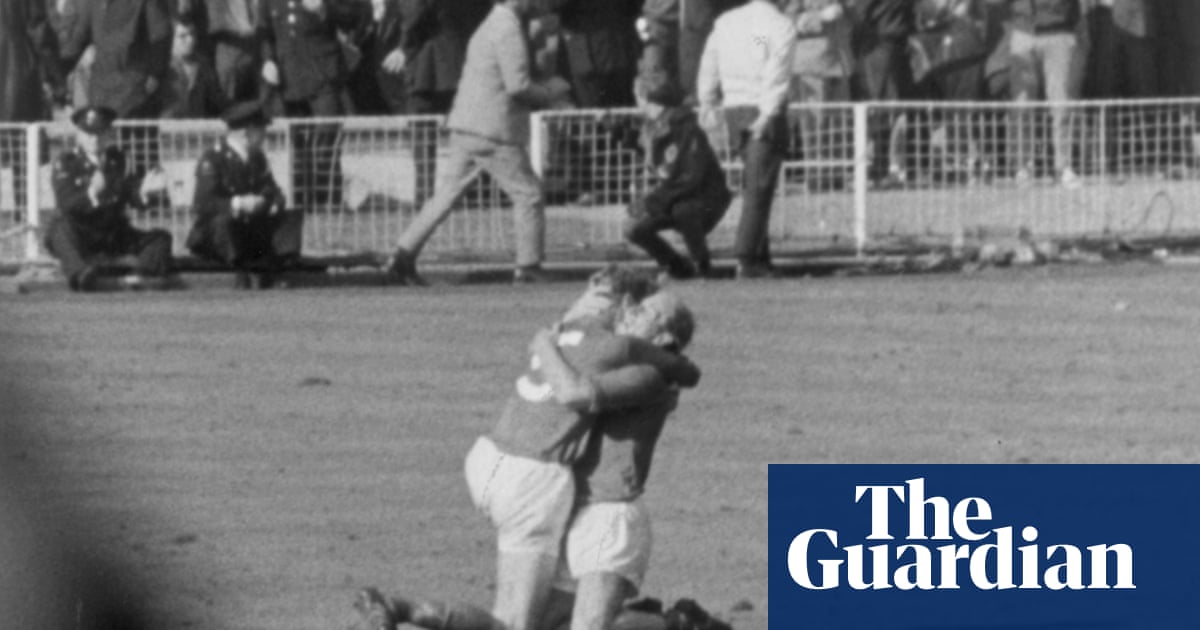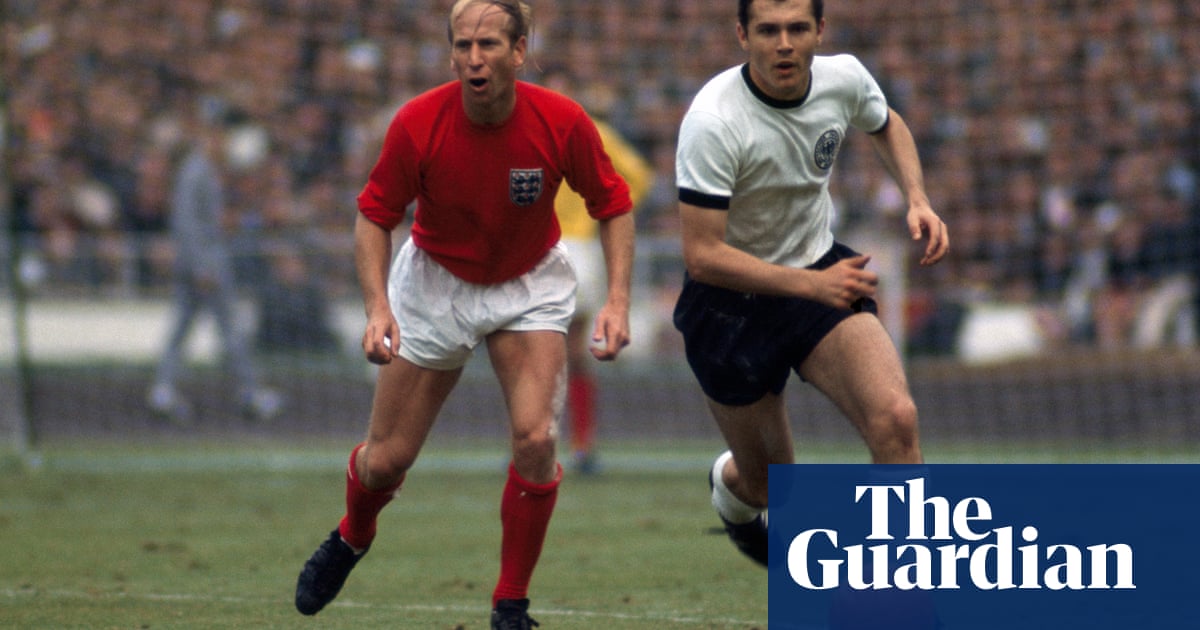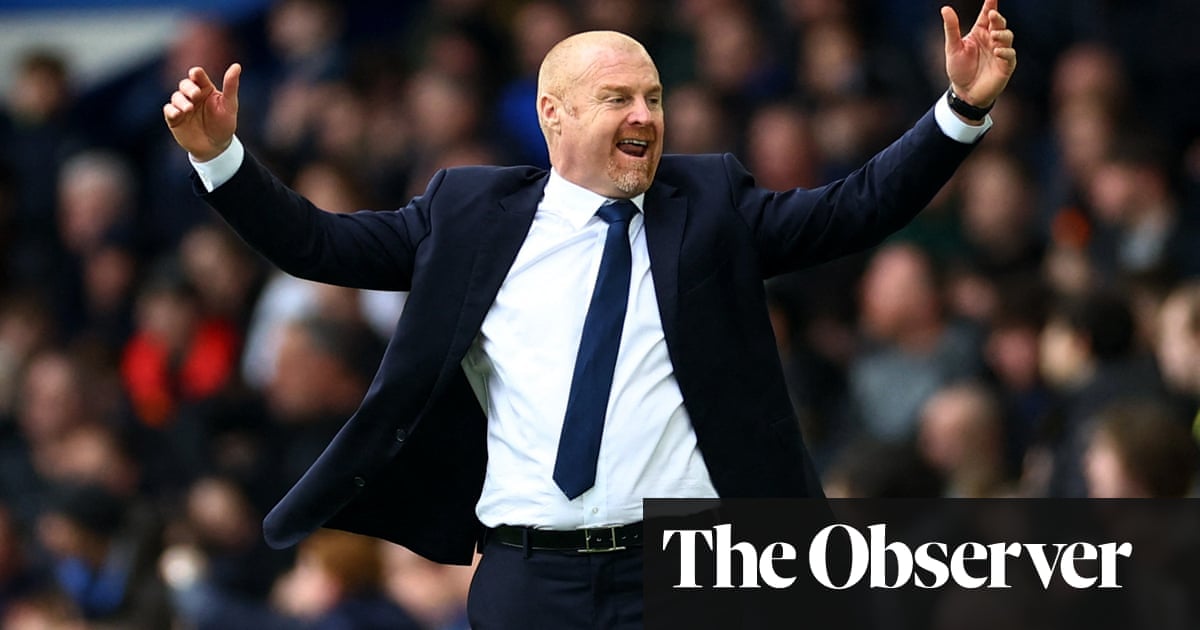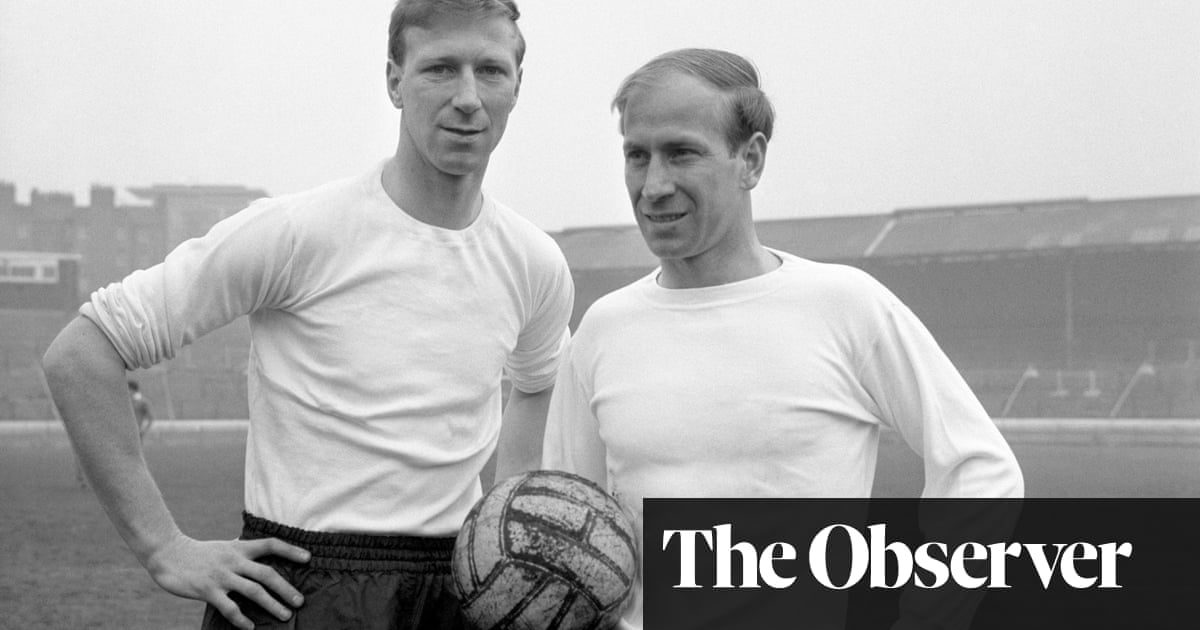
There is a photograph taken seconds after the final whistle had blown in the 1966 World Cup final that shows Jack and Bobby Charlton kneeling in exhausted embrace. It was taken by Albert Cooper, one of the Sun’s northern sports photographers, who had been sent to Wembley for the game. Denied pitch access, perched on a plank at the back of a stand. Too far from the action and struggling with a 300mm f5.6 Novoflex lens and no tripod, he shot pretty much nothing of any value that day until, with fans jumping all around him and the makeshift platform wobbling, he captured the brothers in the moment of their greatest triumph.
It is not, by his own admission, the sharpest shot. A dark triangle – a shoulder? A flag? – covers the bottom left of the uncropped image, but that only adds to the sense of intimacy. For this is an extraordinary moment. There, amid 100,000 celebrating fans, before television cameras broadcasting the game around the world, are two of England’s greatest ever sportspeople, two brothers who had shared a bed through their childhood, locked in a moment of private ecstasy.
Who knows what was said then? The accounts they subsequently gave were inconsistent. According to Bobby, he said: “Our lives will never be the same.” According to Jack he said: “What is there to win now?” Who knows what was felt? Joy? The emptiness that follows the completion of a quest? Did they think back to their home on Beatrice Street in Ashington? Of their parents in the stand – of their mother, Cissie, who was always with them, and of their father, Bob, who was so doggedly committed to his sense of duty that he had missed most of the semi-final because he was down the pit?
Neither ever, in hundreds of interviews and public appearances, made much attempt to articulate what that moment is like. And perhaps it is by its nature ineffable. How does it feel to win a World Cup? How can anybody possibly explain that? And that, perhaps, is why that image is so powerful, because it encapsulates, even as the seam on Jack’s shorts appears on the verge of splitting, the mingled sense of fatigue and accomplishment.
But it is also significant for two other reasons. First because, however frosty their relationship would become, it shows clearly the fraternal love between them. And second because, although neither surely expected it, that was the moment at which the dynamic of their relationship began to change. Bobby had always been the more talented brother, smarter, better-looking, much better at football. He still had two more years of great success to come, but with hindsight that World Cup final was the moment at which Jack caught him up.
Jack was born nearly two and a half years before Bobby. He was, as Cissie put it, “full of devilment”. She soon gave up trying to restrain him, simply dressing him in red to make him easier to find after he had inevitably gone missing. He loved the outdoors and soon took to fishing and poaching. When he got a job at the pit, initially sorting coal on the surface, he would arrive early and set snares for rabbits, selling them on the way home.
Bobby was very different. Where Jack was volatile and gregarious, quick to anger and quick to forget, Bobby was introverted and quiet. He brooded. From a very early age it was obvious he would follow the family line and be a footballer: four of his uncles played professionally while his mother’s cousin was Jackie Milburn who, even now, is rivalled only by Alan Shearer as the greatest centre-forward in Newcastle’s history.
Nobody thought Jack would be a footballer. When he realised after his first day underground that a life of mining wasn’t for him, he applied to join the police. When a scout for Leeds, where one of his uncles played, offered him a trial, Cissie initially thought they’d got the wrong brother. Suddenly Jack had a decision to make: an interview with the police in Newcastle on the Friday evening, or a trip to Leeds for a trial the following day. Uncertain, he got on the train.
But everybody knew Bobby would be a footballer. When Matt Busby first saw him play, he described him as having the poise of a pianist. Jack, for all his courage and doggedness, never had that.
Although Jack made his league debut first, their careers seemed set on very different trajectories. Bobby won the league in 1956-57 as part of Busby’s brilliant young Manchester United team. Leeds, however, were chaotic. There was little money and no plan and Jack rapidly became disillusioned, rowing with teammates and managers and throwing equipment down a bank at the training ground.
Then came Munich. Grief accentuated Bobby’s tendency for introspection, made him even less gregarious, even more suspicious of outsiders. But it also set in his mind a vision of what football could be; he never rediscovered that idyll of open adventurous individualistic football with his mates.
Football was changing. By the early 60s, a new generation of managers had begun to experiment with a more systematised approach, deploying zonal systems of marking. Foremost among them was Don Revie, who became Leeds manager in 1961. Jack had already begun to attend coaching courses and had none of Bobby’s romanticism. Structures and organisation fascinated him; when he had been a teenager, he had rationalised the routes taken by paper boys in Ashington to make them more efficient (while taking a cut for himself; his grandfather, Tanner Milburn, was a notorious local bookmaker and Jack shared his eye for financial opportunity). Revie rekindled Jack’s love for the game.
Leeds had won promotion in 1964 but, still, it was surprise when Jack, at the age of 29, was called up by England the following year, receiving the news straight after Leeds had beaten Manchester United in an FA Cup semi-final. Delighted, he barged into the opposing dressing room to tell Bobby, who responded: “Well done. Now, fuck off.” Jack asked Alf Ramsey why he had picked him. He didn’t always pick the best players, Ramsey replied, but the players who were right for the system – and he knew Jack wouldn’t trust Bobby Moore, so would cover for him.
There was widespread scepticism but it worked; as England won the World Cup, Jack’s performances were celebrated. “This underrated man,” Tony Pawson wrote in the Observer, “was the best centre-half in the competition – a formidable sweeper who could also attack.”
Bobby’s impact – the vital opening goal against Mexico with a trademark long-range drive, both goals in the semi-final victory over Portugal – was also profound but so expected it passed almost without comment. He played a crucial role in the final as well, going against his instincts to submit to Ramsey’s demands and stifle the forward surges of Franz Beckenbauer. Even he had to accept that football had changed.
Not that Busby was keen to adapt. There were some minor tweaks, but essentially the football that brought Manchester United the league in 1966-67 and then their glorious European Cup triumph a year later, Bobby scoring twice in the final against Benfica, was still the football of the past. “We were the last man to win Wimbledon with a wooden racket,” as the winger John Aston put it. It would be nine years before United won another trophy, by which time Bobby was long gone.
The World Cup was the first trophy Jack had ever won, but they soon began to mount up. To the bewilderment of his Leeds teammates, Jack succeeded Bobby as Footballer of the Year in 1967. He soon added a league title, an FA Cup, a League Cup and two Fairs Cups. It might not quite have matched Bobby’s three league titles, FA Cup and European Cup, but it was far closer than had ever seemed likely. “My proudest moment,” their mother said in the early 70s, “was when they both walked out of the tunnel together at Wembley – then Jack had reached Bobby’s peak.”
It was an astute observation, but also a curious one: for Cissie this was less about watching two of her children win the World Cup for England than about her eldest boy catching up with the apparently more talented second son. Perhaps it was no more than a slightly clumsy remark from somebody unused to being on television, but it captured a truth.
And, expressed so bluntly, it perhaps reflected how Bobby’s relationship with the rest of his family had begun to sour, largely because of friction between his wife and his mother. When Jack presented Bobby with a lifetime achievement award at the BBC Sports Personality of the Year awards in 2008, both wept at the public reconciliation after years of estrangement.
But Cissie had been right, at least from a football point of view. By the time both ended their league careers on the final day of 1972-73, Jack was playing for a successful side that had narrowly missed out on two further trophies, while a frustrated Bobby felt let down by his teammates as Manchester United slithered further and further from their peak. Their managerial careers were barely comparable. Bobby’s was over within two disappointing campaigns in which he oversaw Preston’s relegation to Division Three; Jack was still managing two decades later, having earned promotion with Middlesbrough and Sheffield Wednesday and inspired the great renaissance of Irish football.
30 July 1966 was a great day for the English game and for one of England’s great sporting families. But it was more than that. Bobby was arguably the greatest player in English history, but that was when his brother emerged from his shadow. They were perhaps never closer than in the moment Cooper captured, both emotionally and in terms of achievement.
Jonathan Wilson is the author of Two Brothers: the Life and Times of Bobby and Jackie Charlton












